“Valkyrie” ends happily in Switzerland
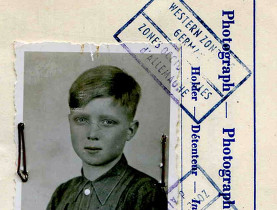
A little known Swiss chapter in the story of the failed attempt to assassinate Adolf Hitler in 1944 was reopened this weekend.
When Claus von Stauffenberg in the film Valkyrie – where he is played by Tom Cruise – is executed, there is a flashback to a farewell scene with his family. But what happened to the wives and children of the many plotters who were put to death?
Previously unknown to historians, dozens of sons and daughters of the executed members of the German resistance were brought to Switzerland to recuperate in the late 1940s.
Forty of them returned this weekend to revisit the families in canton Bern who hosted them, and see a children’s home in the Bernese Alps where many were cared for.
“When we gathered on the first evening to talk about our memories of Switzerland as children between 1947 and 49, we realised how many emotions we still have and how thankful we are when we think of this period,” Hans-Manfred Rahtgens, chairman of the association representing the group told swissinfo.ch.
Rahtgens was born only months before his father, Karl-Ernst Rahtgens, was executed and has no recollection of his time in Switzerland as a three-year-old.
But the memories of others who were older then reveal how traumatised many were.
“It was terrifying to hear gunshots, so I crawled under the bed and screamed, ‘mommy, mommy, help me, the Russians are coming’.” Mechthild von Kleist was so scared hearing Swiss soldiers take target practice in a field nearby that she refused to come out from under her bed for two days.
Concentration camp
In 1944 during the round up of the plotters, Alfred von Hofacker witnessed his mother and older siblings taken away to a concentration camp. He himself was put in a home not knowing what had happened to them, and was fearful he would wind up in another home when he learned after the war that he would travel to Switzerland.
“So I was surprised to end up in a family with a son my age and we quickly became friends,” von Hofacker told swissinfo.ch.
That friend was Thüring von Erlach. “I knew his father had been executed. That made an impression on me. We intentionally didn’t speak about it because we knew he was staying with us to get his strength back,” said the Swiss man.
Von Erlach’s godfather was Albert von Erlach, the controversial Bernese doctor and colonel who used his connections in the Allied sectors of occupied Germany and in Switzerland to organise the Swiss trip.
Nazi sympathiser
Besides his love for children (von Erlach had no offspring of his own), it is unclear why a man closely associated with Swiss groups sympathetic to Nazi Germany would come to the aid of the sons and daughters of Hitler’s opponents.
It is probable that von Erlach was inspired by Switzerland’s post-war relief effort in Germany, which included bringing around 44,000 malnourished and sick kids to Switzerland to recover.
Rahtgens says the children of the resistance most likely would not have qualified under the strict Swiss selection criteria, which singled out the neediest boys and girls.
Even though the Rahtgens and von Hofackers and other children of resistance members grew up in well-to-do German households, their mothers were labelled as traitors up until 1952, and as such, were refused food rations and housing.
“Von Erlach’s assistance did not fit into the larger aid programme because Switzerland developed very specific criteria about who should benefit. One of the main aspects was that there were to be no political considerations,” says German historian Markus Schmitz.
“The treatment of the children of the resistance was quite unusual in the whole Swiss post-war relief effort, and that may be one reason why it has not been researched by historians,” Schmitz added.
Highlight
The return to Switzerland culminated on Sunday with a visit to the former children’s home in the village of Habkern, high above the resort of Interlaken.
Local officials were there to welcome the German entourage as was von Erlach and two women who worked at the home at the time.
Von Erlach said seeing his childhood friend again made it seem as if they had never parted.
One of the elderly former staff members embraced a women she still remembered by name, and told her of her recollections of her and the other “well behaved, resistance children”.
According to Rahtgens, the larger aim of the association representing the children of the German resistance is to “reach out to the youth of today”.
“We must let them know what our fathers did and why they did it. Their resistance came too late and was a failure, but on the positive side it was enormously courageous of them to stand up to such an inhuman regime.
“If we succeed in convincing our children that integrity, respect and the rule of law are goals worthy of following, we can be safe in knowing that they will never be forced to take the kind of decisions our fathers did.”
Dale Bechtel in Habkern, swissinfo.ch
Because of its neutrality, Switzerland did not take part in the United Nations Relief and Rehabilitation operation for war-torn Europe, according to German historian, Markus Schmitz.
Instead, Switzerland founded its own aid programme. In Germany, “Swiss villages” were set up to house and feed orphaned or abandoned children. Food rations included fresh fruit, hard bread, chocolate and the staple of every Swiss pantry, Ovomaltine. Thousands of the sickest children were brought to Switzerland to recover, and supplies of books were sent to German universities to restock their libraries.
Schmitz says Switzerland had an interest in a stable, post-war Germany for a variety of reasons: It was essential for Swiss security interests since there was a fear of the growing influence of the Soviet Union on central Europe. Germany was also one of Switzerland’s most important trading partners, and the countries, along with Austria, shared a common culture through the German language.
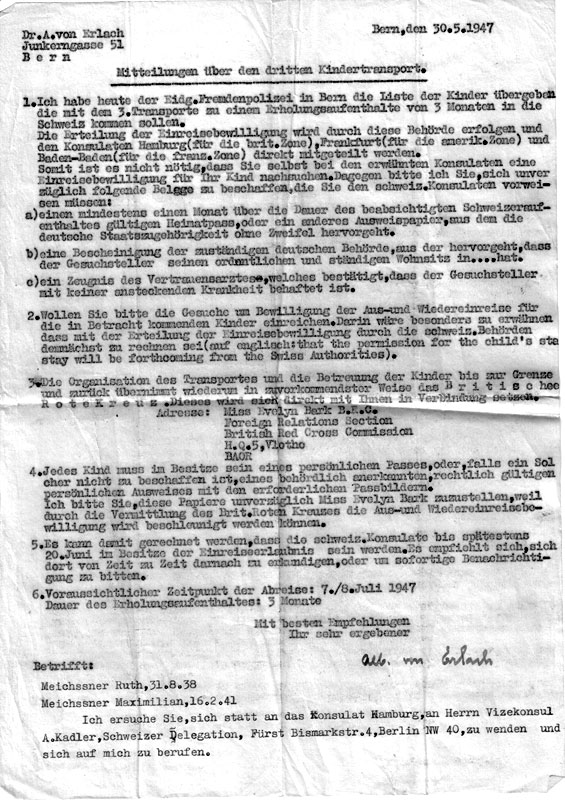

In compliance with the JTI standards
More: SWI swissinfo.ch certified by the Journalism Trust Initiative

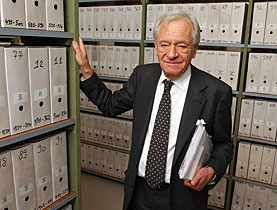
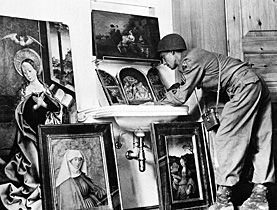
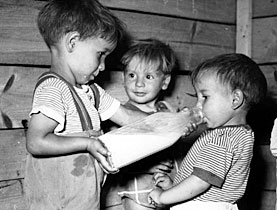

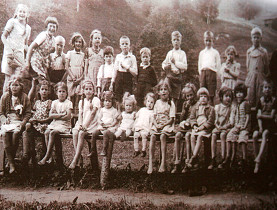
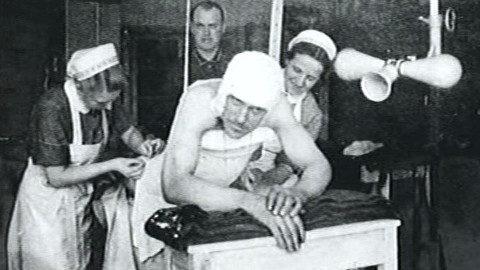
You can find an overview of ongoing debates with our journalists here. Please join us!
If you want to start a conversation about a topic raised in this article or want to report factual errors, email us at english@swissinfo.ch.